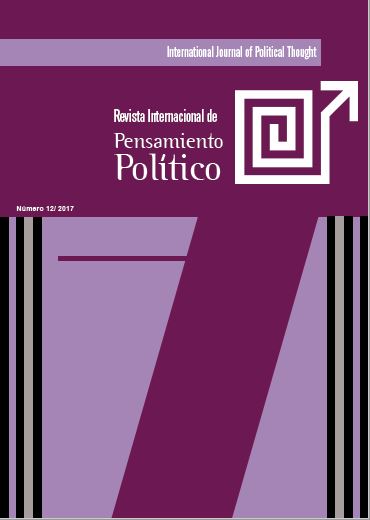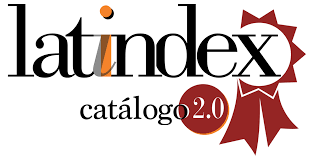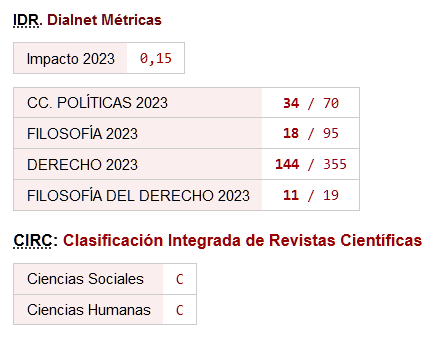Psychological war reloaded: cyber-sanctions, Venezuela and geopolitics
DOI:
https://doi.org/10.46661/revintpensampolit.3227Keywords:
psychological warfare, national security, geopolitics, cyber-sanctions, economic sanctions, VenezuelaAbstract
In the following text we will tackle the geopolitical dimension of economic sanctions, as a key tool of US foreign policy in the frame of a wide range psychological war, ultimately related to the capacities and possibilities of the expansion of neoliberalism. We will focus on economic sanctions against Venezuela and against cyber malicious activities as emblematic cases, posing that in spite of the apparent disconnection between them, both are linked by US geopolitical (geostrategic) interests that are crucial components of the “national security” definition coined by the Cold War foreign policy establishment (public/ private interests) which prevailed until today. Those material interests are guaranteed by the reproduction of an ideology that legitimizes and naturalizes this way of thinking/ making security in a national and mainly in an international level. In this process, mass media, internet and social networks play an essential role.
Downloads
References
Armitage, R. y Nye, J. (2007) “CSIS Commission on Smart Power. A smarter more secure America”, Center for Strategic & International Studies, Washington DC.
Arroyo Ramírez, T. (2014) Seguridad Nacional, terrorismo y telecomunicaciones: el impacto de la nueva estrategia hegemónica en la América Latina del Siglo XXI. Tesis doctoral, Programa de Posgrado en Estudios Latinoamericanos, Universidad Nacional Autónoma de México
Assange, J. (2014) “Google is not what it seems”. Disponible en: https://wikileaks.org/google-is-not-what-it-seems/ (Última fecha de consulta: 15/10/2017)
AVN (3 marzo 2014) “Wikileaks evidences US funding to Venezuela›s fascism”. Disponible en: http://www.avn.info.ve/contenido/wikileaks-evidences-us-fundingvenezuela039s-fascism (Última fecha de consulta: 12/08/2017)
Barnet, R. (1974) Guerra perpetua: Los hombres y las instituciones responsables de la política exterior de Estados Unidos. México: FCE.
BBC, 19 febrero 2014, “Seis preguntas para entender las protestas en Venezuela” http://www.bbc.com/mundo/noticias/2014/02/140214_venezuela_protestas_preguntas_respuestas_wbm
BBC (26 julio 2010) “US says Wikileaks could ‘threaten national security’” http://www.bbc.com/news/world-us-cana-da-010758578
CIA.bo (Comunidad de Investigadores Antiimperialistas de Bolivia) (27 agosto 2017) “Congreso EEUU planea declarar Wikilieaks servicio hostil de inteligencia” http://www.cia.bo/2017/08/27/planea-declarar-wikileaks-servicio-hostilinteligencia/ (Última fecha de consulta: 12/12/2017)
Clinton, H. (2010) “Remarks on internet freedom”. The Newseum, Washington DC, 23 enero.
El Mundo (21 marzo 2016) “¿Qué se deben Cuba y EEUU? Las deudas pendientes” http://www.elmundo.es/internacional/2016/03/21/56efad9322601deb53 8b4594.html
Encyclopedia of the New American Century (2017) “Embargoes and sanctions. Cold War Sanctions” http://www.americanforeignrelations.com/E-N/Embargoesand-Sanctions-Cold-war-sanctions.html (Última fecha de consulta: 6/10/2017)
García Linera, Á. (2015) Socialismo comunitario: un horizonte de época. La Paz: Vicepresidencia del Estado. Presidencia de la Asamblea Legislativa Plurinacional de Bolivia.
Haas, R. (1998) “Economic Sanctions too much of a bad thing”. Brookings institution. Disponible en: https://www.brookings.edu/research/economic-sanctionstoo-much-of-a-bad-thing/
Kelly, J. (2015) “Leading at the Nexus of Development and Defense” Conferencia del Comandante del Comando Sur. Center for Strategic and International Studies, 23 de octubre. Disponible en: http://csis.org/event/leading-nexus-development-anddefense
LIFE en español (1958) “Oleoaldeas en Venezuela”. Número especial: el yanki en el extranjero, 27 enero, vol 2, n°1.
Lippmann, W. (1943) U.S. Foreign Policy. Shield of the Republic. New York: Pocket Books.
Masters, J. (FECHA) “What are economic sanctions?” Council on Foreign Affairs. Disponible en: https://www.cfr.org/backgrounder/what-are-economic-sanctions
Melman, S. (1972) El capitalismo del Pentágono: la economía de guerra. México: Siglo XXI.
Nye, J. (2011) “The war on soft power”, Foreign Policy, April. Disponible en: http://www.foreignpolicy.com/articles/2011/04/12/the_war_on_soft_power
Quintana, J. (coord.) (2016) Bolivialeaks. La injerencia política de Estados Unidos contra el proceso de cambio (20062010). La Paz: Ministerio de la Presidencia-Centro de Investigaciones Sociales.
Romano, S. (2013) ¿América para los americanos? Integración regional, dependencia y militarización. La Habana: RuthCasa Editorial.
Romano, S. (2010) “Democracia liberal y seguridad en el Gobierno estadounidense: continuidades y rupturas” en Gandásegui, M. y Castillo Fernández, D. (coord.) Estados Unidos: la crisis sistémica y las nuevas condiciones de legitimación. México: CLACSO-Siglo XXI, pp. 360-384.
Romano, S. y García, A. (2017) “Estados Unidos en Venezuela”. Centro Estratégico de Geopolítica. Disponible en: http://www.celag.org/estados-unidos-en-venezuela/ (Última fecha de consulta: 8/11/2017)
Romano, S.; García, A. y Tirado, A. (2017) “Sanciones de EEUU a Venezuela: el castigo imperial”. Centro Estratégico de Geopolítica. Disponible en: http://www.celag.org/sanciones-eeuu-venezuela-castigo-imperial/ (Última fecha de consulta: 8/11/2017)
Romano, S. y Salas Oroño, A. (2017) “Brasil y el Cono Sur en la geopolítica estadounidense”. Centro Estratégico de Geopolítica. Disponible en: http://www.celag.org/brasil-y-el-cono-sur-en-la-geopolitica-estadounidense/(Última fecha de consulta: 20/9/2017)
Rostow, W. (1962) Los Estados Unidos en la palestra mundial. Madrid: Tecnos
Schlesinger, S. y Kinzer, S. (1987) Fruta amarga. La CIA en Guatemala. México: Siglo XXI.
Sivlerberg, D. y Heimann, J. (2009) “An ever-expanding war: legal aspects of online strategic communications (Report)” Parameters, pp. 77-94
The Globe and Mail (13 abril 2017) “WikiLeaks a ‘hostile intelligence service’ and threat to U.S. security: CIA director” https://beta.theglobeandmail.com/news/world/wikileaks-a-hostile-intelligenceservice-and-threat-to-us-security-cia-director/article34706829/?ref=http://www. theglobeandmail.com&
The Hill (29 marzo 2017) “White House extends Obama executive order on cyber threats” http://thehill.com/policy/cybersecurity/326439-white-house-extends-state-of-emergency-for-cyber-threats
Tinker Salas, M. (2009) The enduring legacy: oil, culure and society in Venezuela. Duke University Press.
Wills, G. (2010) Bomb power. The modern presidency and the national security state. New York: Penguin Books.
Zizek, S. (2003) Ideología. Un mapa de la cuestión. Buenos Aires: Siglo XXI.
Downloads
Published
How to Cite
Issue
Section
License
Copyright (c) 2018 Revista Internacional de Pensamiento Político

This work is licensed under a Creative Commons Attribution-NonCommercial-ShareAlike 4.0 International License.
Open access policy
Free and open access is allowed to any interested party to all the contents of the journal issues, free of charge, being able to print and transfer all the articles, with the only condition of specifying the source and authorship.
The journal: a) does not charge authorship costs for the processing of articles or for their submission, b) maintains copyright for authors without restrictions, c) facilitates authors to keep their publication rights without limitations.
The International Journal of Political Thought is an original work of the Laboratory of Political Ideas and Practices of the Pablo de Olavide University. All articles included in the Journal are original work of their respective authors. This Journal is freely offered to the scientific and academic community at no cost and releases the contents according to the license "Attribution-NonCommercial-ShareAlike 4.0 CC BY-NC-SA" of the Creative Commons project available in the following url: https://creativecommons.org/licenses/by-nc-sa/4.0/legalcode
If you wish to translate or compile any of the articles available here, please contact us at contacto












 ISSN: 1885-589X
ISSN: 1885-589X  Universidad Pablo de Olavide
Universidad Pablo de Olavide